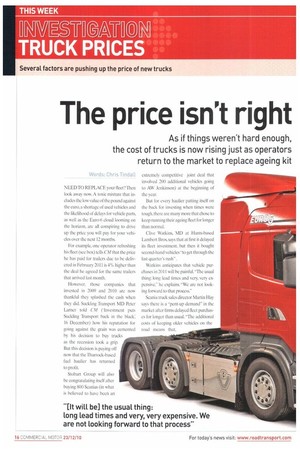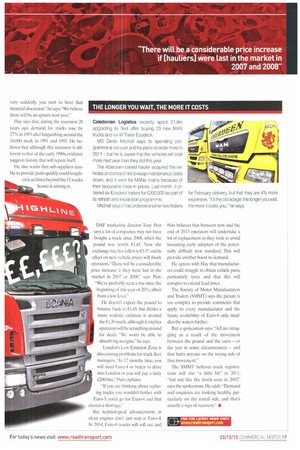The price isn't right
Page 16

Page 17

If you've noticed an error in this article please click here to report it so we can fix it.
As if things weren't hard enough, the cost of trucks is now rising just as operators return to the market to replace ageing kit
Words: Chris Tindatt NEED TO REPLACE ■.,our fleet? Then look away no A toxic mixture that includes the low value of the pound against the euro, a shortage of used vehicles and the likelihood of delays for vehicle parts, as well as the Euro-6 cloud looming on the horizon, are all conspiring to drive up the price you will pay for your vehicles over the next 12 months.
For example. one operator refreshing his fleet (see box) tells CM that the price he has paid for trailers due to he delivered in February 2011 is 4% higher than the deal he agreed for the same trailers that atrived last month.
However, those companies that invested in 2009 and 2010 are now thankful they splashed the cash when they did. Suckling Transport MD Peter Lamer told CM (Investment puts Suckling Transport hack in the black'. 16 December) how his reputation for going against the grain was cemented by his decision to buy trucks as the recession took a grip. But this decision is paying off now that the 'Iburrock-based fuel haulier has returned to profit.
Stobart Group will also be congratulating itself after buying 800 Scanias (in what is believed to have been an extremely competitive joint deal that involved 200 additional vehicles going to AW Jenkinson) at the beginning of the year.
But for every haulier patting itself on the back for investing when times were tough, there are many more that chose to keep running their ageing fleet for longer than normal.
Clive Watkins, MD at Hants-based Lambert Bros. says that at first it delayed its fleet investment, but then it bought second-hand vehicles "to get through the last quarter's rush".
Watkins anticipates that vehicle purchases in 2011 will be painful. "The usual thing: long lead times and very, very expensive," lie explains. "We are not looking forward to that process."
Scania truck sales director Martin Hay says there is a "pent-up demand" in the market after firms delayed fleet purchases for longer than usual. "The additional costs of keeping older vehicles on the road means that, very suddenly, you start to have that financial discussion," he says."We believe there will he an upturn next year."
Hay says that, during the recession 20 years ago, demand for trucks rose by 27% in 1993 after languishing around the 16,000 mark in 1991 and 1992. He believes that although this recession is different to that of the early 1990s, evidence suggests history that will repeat itself.
He also warns that sub-suppliers unable to provide parts quickly could lengthen lead times beyond the 11 weeks Scania is aiming at.
THE LONGER YOU WAIT, THE MORE IT COSTS
Caledonian Logistics recently spent 8m upgrading its fleet after buying 23 new MAN trucks and six W Trailer Ecodeck.
MD Derek Mitchell says its spending programme is not over and he plans to order more in 2011 — but he is aware that the vehicles will cost more next year than they did this year.
The Aberdeen-based haulier acquired the vehicles on contract hire to keep maintenance costs down, and it went for MANs mainly because of their favourable trade-in prices. Last month, it ordered six Ecocleck trailers for £200,000 as part of its refresh and expansion programme.
Mitchell says it has ordered another two trailers DAF marketing director Tony Pain says a lot of companies may not have bought a truck since 2008, when the pound was worth €1.45. Now the exchange rate has fallen to €.1.17 and its effect on new vehicle prices will shock operators, "There will be a considerable price increase if they were last in the market in 2007 or 2008," says Pain.
"We've probably seen a rise since the beginning of this year of 20%, albeit from a low level."
He doesn't expect the pound to bounce back to €1.45. but thinks a more realistic estimate is around the €1.30 mark. although it implies operators will be scratching around for deals: "We won't be able to absorb big margins," he says.
London's Low Emission Zone is also causing problems for truck fleet managers. -In 12 months time, you will need Euro-4 or better to drive into London or you will pay a daily £200 fine," Pain explains.
if you are thinking about replacing trucks, you wouldn't bother with Euro-3, you'd go for Ettro-4 and that creates a shortage."
But technological advancements in clean engines don't just stop at Euro-4. In 2014, Euro-6 trucks will roll out and for February delivery, but that they are 4% more expensive. "It's the old adage: the longer you wait, the more it costs you," he says.
Pain believes that between now and the end of 2013 operators will undertake a lot of replacement as they look to avoid becoming early adopters of the potentially difficult new standard. This will provide another boost to demand.
He agrees with Hay that manufacturers could struggle to obtain vehicle parts, particularly tyres, and that this will conspire to extend lead times.
The Society of Motor Manufacturers and Traders (SMMT) says the picture is too complex to provide comments that apply to every manufacturer and the future availability of Euro-6 only muddies the waters further.
But a spokesman says: "All are struggling as a result of the movement between the pound and the euro — or the yen in some circumstances — and that hurts anyone on the wrong side of that movement."
The SMMT believes truck registrations will rise "a little bit" in 2011, "but not like the levels seen in 2007," says the spokesman. He adds:"Dcmand and enquiries are looking healthy, particularly on the rental side, and that's usually a sign of recovery." •
FOR THE LATEST NEWS VISIT:
winow.roadtransport.com
































































































































